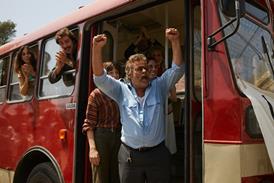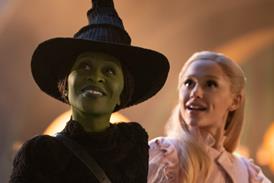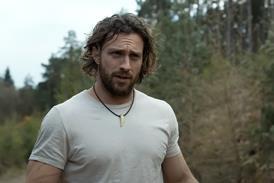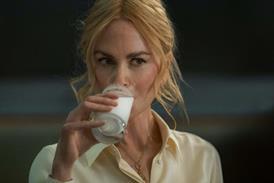Dir. Robert Altman. US-Germany. 2003. 112mins.
A feast for balletomanes, but with very little else to offer the rest of the audience, Robert Altman's new film may be a splendid promo reel for Chicago's Joffrey Ballet Company. But do not expect anything like his brilliant forays into American music in Nashville, or American cinema in The Player, which went beyond the confines of their respective themes to deliver fascinating insights into the American experience as a whole. Consisting mostly of lavishly photographed rehearsals and the subsequent performances of the same pieces before live audiences, with titbits of inconsequential dialogue inserted in-between to provide a semblance of dramatic continuity, the picture will be evidently carried through its original release by the general curiosity generated by Altman films. Neve Campbell's fans will also be interested to see her realise her dream and become a prima ballerina. But once past the first glow, its dramatic slimness will make it difficult to crossover into a more extensive distribution.
Following a number of stage productions from the preparatory phase to their actual presentation, this typical backstage look at the work of a ballet troupe skims over most of the predictable ingredients of the genre but never really bothers to go into details on any of them.
As expected, there is a genial but despotic artistic manager. Alberto Antonelli (Malcolm McDowell), who runs the company with a fist of iron in a glove of silk, threatening and cajoling, demanding and comforting, sympathetic but ruthless when the need arises, is a man whose vision is clearly that the good of the company is the only priority in sight. And there are the heartaches of the rising young dancer, Ry (Neve Campbell), who is dumped in the first reel by her dancing partner and ends up, by the last reel in the loving arms of an alluring assistant chef (James Franco).
And that's about all there is, in terms of significant dramatic personae, though, predictably enough, all the classic cliches associated with performing arts occur in the course of the film, from torn ligaments that change career patterns, through tantrums of veterans who fear for their status and are terrified by any change that might alter familiar routines, to budget restrictions, mentioned as a factor but apparently never put into real practice, at least not in this picture.
Tempers flare once in a while, dancers' agents interfere, stars demand promotion. But there is nothing really serious to endanger the smooth operation of the company and its regular stream of premieres.
Altogether, Altman has chosen, for reasons of his own, to avoid any deeper exploration of many elements that he does bring up in the course of the film. The star system, which exists in the world of ballet as much as in any of the other performing arts, is consistently ignored, or if mentioned, immediately stamped upon as a minor issue. While alluded to, the economic complexities of keeping such a costly, and relatively restricted, art form going are quickly forgotten. The general notion promoted here is that dancers are idealistic dreamers who happily accept the gruelling demands of their profession only for the sake of art and momentary glory, despite the insignificant financial rewards. A bit optimistic, given the public knowledge of what life on the stage is like, anywhere.
The network for the Altman trademark orchestration of multiple story lines is laid down here as expected but never developed, replaced instead by the focus on two characters who have nothing particularly original about them. McDowell plays Antonelli with a kind of facile cocky bravura, bordering on the ridiculous when he is lecturing his troupe on the psychological motivations of a dance, and it is strange to see the character, specifically referred to as an Italian-American, speaking so often with such a distinctive British accent.
As for Campbell, who launched the entire project and is credited as one of the producers, her past training with National Ballet of Canada comes in handy and she acquits herself honourably of the most difficult part in her role, the dancing chores. Franco, one of the leads in Altman's next project, to be dedicated to the NY theatre scene, is under-utilised as her love interest.
The most impressive and memorable presence in the film is the Joffrey Ballet Company itself, and the most rewarding moments - luckily there is an abundance of them - are the dance scenes, in rehearsal but most particularly on stage. The lively, inventive, colourful and always enjoyable Joffrey productions featured in this film are gloriously served by Altman's technical crew and it is a pity that no credits were made available in Toronto for the choreography and the production of the stage shows, nor for that matter, of the dancers, many of whom assume small, but significant dramatic parts. Without them, there would be no film at all.
Prod cos: Marly Pictures, CP Medien, Capitol Films, Killer Films, SRO Entertainment, Sandcastle 5 Productions
Int'l sales: Capitol Films
Prods: David Levy, Joshua Astrachan, Neve Campbell, Robert Altman, Christine Vachon, Pamela Koffler
Co-prods: Jane Barclay, Sharon Harel, Hannah Leader, John Wells, Roland Pellegrino, Dieter Meyer, Stefan Jones, Jonas McCord
Scr: Barbara Turner
Ed: Geraldine Peroni
Prod des: Gary Baugh
Music: Van Dyke Parks
Sound: Michael Berry, Eliza Paley, Peter Glossop
Main cast: Neve Campbell, Malcolm McDowell, James Franco, Emma Harrison


















No comments yet